The US Campaign for Palestinian Rights has a list of over 170 boycott and divestment successes in the United States, as of November 2016. See the list
On this page:
• Pillsbury Boycott
• International HP Boycott
• HP-free Churches Campaign from FOSNA
• G4S Campaign
• Drop G4S Campaign from FOSNA
• “Stolen Beauty” Ahava Campaign
• “Stolen Homes” AirBnB Campaign
• Boycott Resources
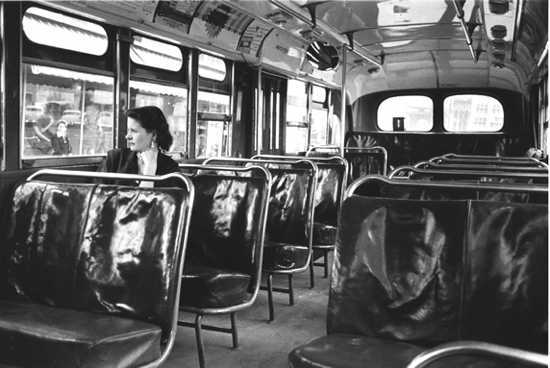 For generations, boycotts have been powerful, non-violent, economic tools for social justice advocacy. Examples of successful boycotts in the United States include the landmark 1950’s Montgomery Bus Boycott during the Civil Rights Movement (photo, right), the 1960’s grapes boycott led by Cesar Chavez on behalf of farm workers, the boycott of Nestle products in the 1970s’ and 80’s, and an ecumenical boycott of Mt. Olive Pickle Co. in the 2000’s, also in support of farm workers.
For generations, boycotts have been powerful, non-violent, economic tools for social justice advocacy. Examples of successful boycotts in the United States include the landmark 1950’s Montgomery Bus Boycott during the Civil Rights Movement (photo, right), the 1960’s grapes boycott led by Cesar Chavez on behalf of farm workers, the boycott of Nestle products in the 1970s’ and 80’s, and an ecumenical boycott of Mt. Olive Pickle Co. in the 2000’s, also in support of farm workers.
Today justice advocates around the world are answering the Palestinian call for economic action by with three varieties of boycotts:
– boycotting products produced by companies who manufacture in the illegal Israeli settlements, thereby operating on stolen land and supporting the economic viability of the settlements,
– boycotting products of companies that are supporting and enabling Israeli oppression of Palestinians in other ways, and
– boycotting products from any Israeli company.
Many church-based organizations and others focus exclusively on the first: products from the settlements, sometimes referred to as “boycotting the occupation.” Others have said that, since Israel is the occupying power, making a distinction between companies operating in the occupied territories and those within Israel proper (within the Green Line, the internationally recognized borders of Israel) is a misleading distinction; therefore all Israeli products should be boycotted.
Any of these boycotts, whether targeting settlements products or having a broader focus, provide an effective and practical way that individual citizens and organizations can support the cause of justice in Israel/Palestine and motivate companies to stop participating in and enabling the oppression and ethnic cleansing of Palestinians.
The boycott and divestment campaigns featured on Palestine Portal involve faith-based groups as key organizers and partners, or they are important campaigns of interest to faith advocates, though they may be organized and led by others.
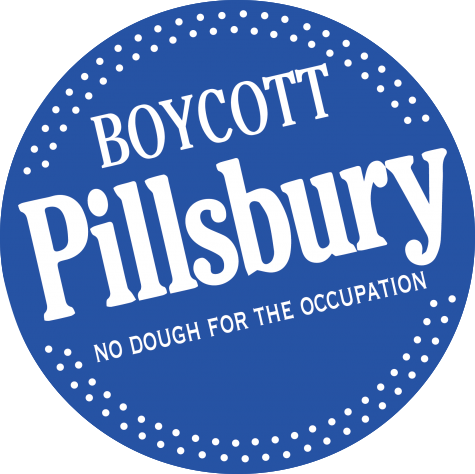 No Dough for Occupation: #BoycottPillsbury
No Dough for Occupation: #BoycottPillsbury
Tell General Mills to get out of illegal Israeli settlements!
The U.N. has named General Mills as one of the 112 businesses that are violating international law by operating in occupied Palestinian territories. General Mills is profiting from apartheid and contributing to gross human rights violations against Palestinians. Yet General Mills has endorsed the UN Guiding Principles on Business and Human Rights! A broad coalition of faith-based and secular partners are calling on this corporation to put their principles into practice. Learn more about this boycott (scroll down that page for great resources)
See this article: We’re boycotting Pillsbury. Here’s why you should join us.
Send a message to General Mills: Stop manufacturing on stolen land!
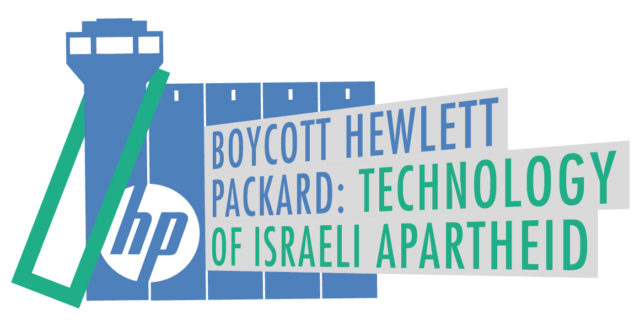 HP Boycott
HP Boycott
(see also the HP-Free Churches Campaign below)
FROM THE BDS NATIONAL COMMITTEE:
HP plays a key role in Israel’s oppression of Palestinians. It provides technology, equipment and services to the Israeli military, including for the checkpoints and ID card system that underpin Israel’s apartheid policies and its movement restrictions for Palestinians. The international Boycott HP campaign has already seen several US churches divest from the company and has attracted support from student governments across the US.
Why Boycott HP?
HP provides and operates much of the technology infrastructure that Israel uses to maintain its system of apartheid and settler colonialism over the Palestinian people. Hewlett Packard Enterprise is the prime contractor of the Basel system, an automated biometric access control system employed within Israel’s checkpoints and apartheid wall. The ID cards distributed as part of this system form the basis of Israel’s systematic discrimination against Palestinians. HP technology helps the Israeli navy enforce the siege on Gaza.
In November 2015, HP split into two firms: HP Inc. for consumer hardware (PCs and printers), and Hewlett Packard Enterprise for business and government services. Because the companies share facilitates, branding and supply chains, and collaborate in a wide range of ways, both remain deeply complicit with Israeli apartheid.
HP has been described as the “Polaroid of our times”, a reference to huge mobilizations against the use of Polaroid technology used for the South African apartheid regime’s passbook system. Polaroid’s 1977 withdrawal from South Africa marked a turning point in the international effort to end apartheid.
Learn more about HP’s role in Palestine including the checkpoints, the use of ID cards, the siege on Gaza, Israel’s prison system and HP’s role in worldwide repression: https://bdsmovement.net/boycott-hp#why
Learn more about the HP boycott with AFSC: https://www.afsc.org/hp
See more on HP’s activities from the research of AFSC:
http://investigate.afsc.org/company/hp-inc-and-hewlett-packard-enterprise
See news about the boycott at this HP Boycott website: http://hpboycott.org/
Follow the HP Boycott in social media:
Twitter: @hpboycott
Facebook: https://www.facebook.com/HPboycott
 HP-Free Churches Campaign from FOSNA
HP-Free Churches Campaign from FOSNA
See the video “Why Boycott HP?” above.
Hewlett-Packard (HP) is one of the largest contractors of the U.S. defense industry. The technology created by HP helps deport U.S. immigrants on a scale we have never seen, tracks Americans held within the massive and discriminatory incarceration system, and denies Palestinians freedom of movement in the West Bank and Gaza. Hewlett-Packard sells the tools necessary for state repression: surveillance and population registration technologies. The biometric IDs, fingerprinting, and retinal scanning equipment and software developed by HP are critical to Israel’s ability to maintain segregation and apartheid.
We know from the anti-apartheid campaign against Polaroid in the 1970s that public pressure can sway a corporation from profiting off the violation of human rights. Several U.S. denominations are leading the way and have already divested from HP including the Presbyterian Church, Unitarian Universalists, United Church of Christ, Quaker Friends Fiduciary, and Alliance of Baptists. Now is the time for each of us to ensure we personally do not purchase HP products including computers, printers, and ink; and that our churches rise to the call to do the same.
WHAT YOU CAN DO:
Sign the HP Boycott Pledge
Use FOSNA’s presentation at your church and ask them to become an HP-Free Church (scroll down the page)
When your church is on board, fill out this form
Get resources and learn more about this campaign with FOSNA:
http://www.fosna.org/free-your-church-hp
See UMKR resources for the HP Boycott, including “This is my last HP” labels and a Quick Facts sheet
G4S Campaign
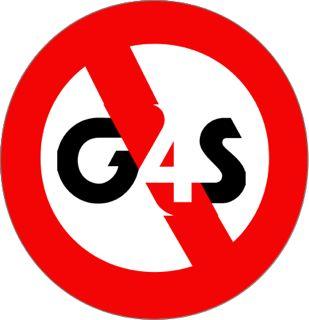 FROM US CAMPAIGN FOR PALESTINIAN RIGHTS:
FROM US CAMPAIGN FOR PALESTINIAN RIGHTS:
G4S is a British private security company that helps Israel run prisons where Palestinian political prisoners are detained.
Each year the Israeli army arrests thousands of Palestinians in an attempt to suppress any opposition to its continued occupation and apartheid policies. They are arrested under Israeli military orders that prohibit basic civil, cultural, and political rights such as the attendance of demonstrations, membership of political organizations, and the writing of slogans on the Apartheid Wall.
G4S Israel provides security apparatus, surveillance systems, and maintenance services to Israeli incarceration facilities inside Israel and the occupied West Bank where Palestinian political prisoners are held, oftentimes tortured. The company also provides scanners to Israeli military checkpoints and security services in illegal Israeli settlements.
G4S operates in 120 countries, making it the largest private security company worldwide. In the US, G4S operates privatized juvenile detention facilities and works alongside Homeland Security’s Customs and Border Protection to detain and deport people across the U.S./Mexico border.
Learn more with US Campaign: http://uscpr.org/campaigns/g4s/
DROP G4S Campaign from FOSNA
 FROM FRIENDS OF SABEEL NORTH AMERICA:
FROM FRIENDS OF SABEEL NORTH AMERICA:
Israel practices a systematic policy of arresting, detaining, and torturing Palestinian children. According to numerous human rights organizations, Israel is guilty of holding roughly 700 children in prison each year. Group 4 Securicor (G4S) has numerous contracts with Israeli ministries to provide security infrastructure, communication equipment, and full body scanners to the Israeli prison system. We cannot stand idly by while G4S profits from well-documented human rights abuses and the subjugation of an entire people. We cannot allow our government or our own investment vehicles to provide capital for the expansion of the occupation of Palestine and the industrial prison system in the United States.
Learn more with FOSNA: http://www.fosna.org/dropg4s
“Stolen Beauty” campaign, the Ahava Boycott
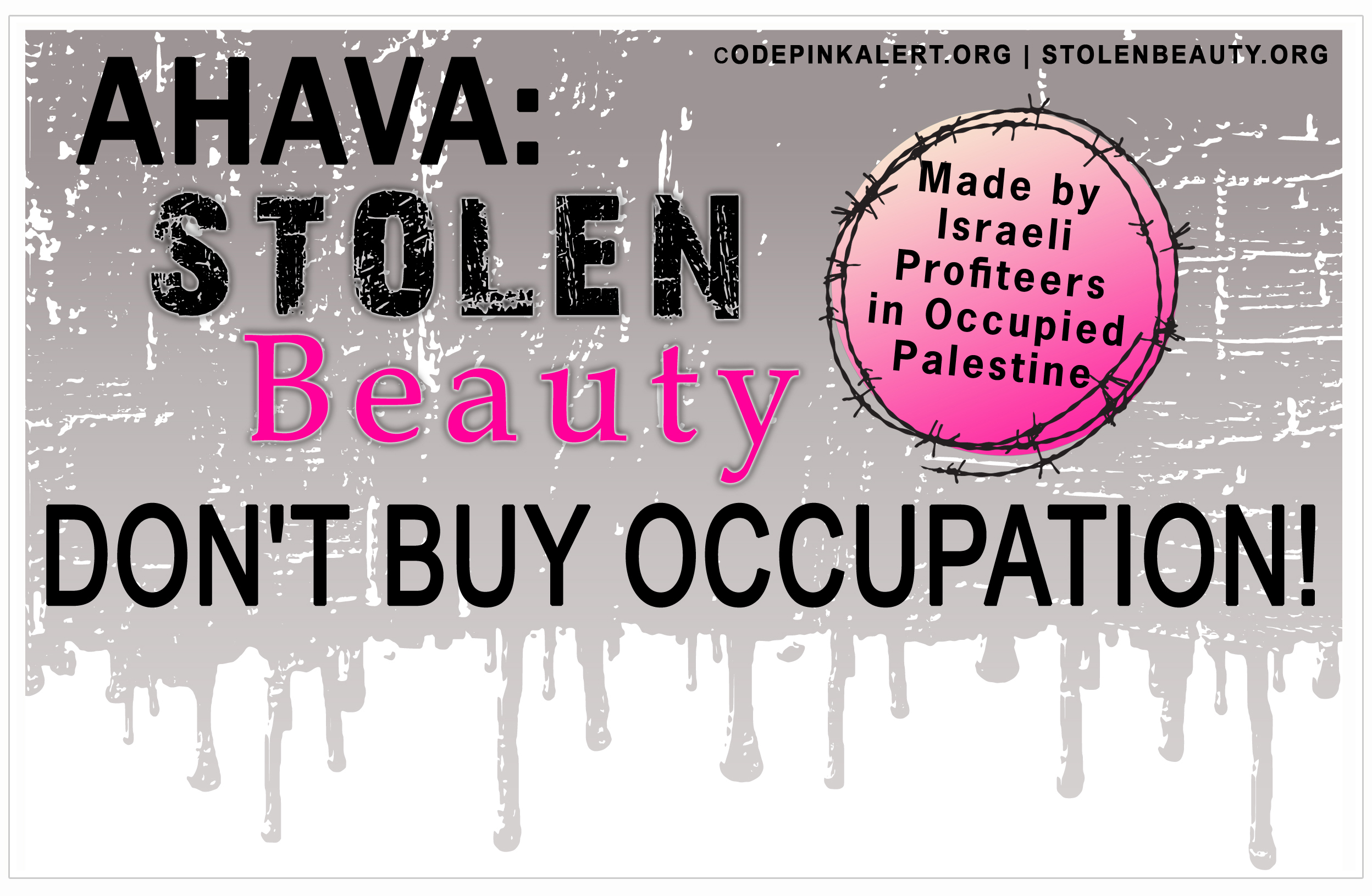 FROM CODEPINK:
FROM CODEPINK:
In June of 2009, CODEPINK launched its Stolen Beauty boycott campaign (www.stolenbeauty.org) against the Israeli cosmetics manufacturer Ahava Dead Sea Laboratories. We chose Ahava because, although it labels its products as “made in Israel,” its main manufacturing plant is located in an illegal settlement in the Occupied Palestinian West Bank; and its practice of excavating mud from the shores of the Dead Sea in the Occupied West Bank for use in its products is against international law. The settlements in the West Bank—all of which are illegal under international law—are an impediment to a just peace for both Israelis and Palestinians.
The company is 44% owned by two settlements—Mitzpe Shalem and Kalia—which directly profit from Ahava’s sales. All Israeli settlements in the West Bank violate international law.
Don’t let the “Made in Israel” sticker fool you—when you buy Ahava products you help finance the destruction of hope for a peaceful and just future for both Israelis and Palestinians.
Learn more with Codepink: http://www.stolenbeauty.org/
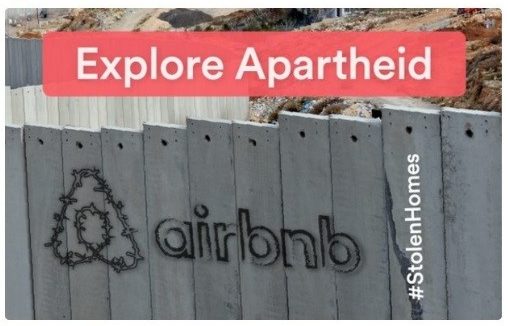 “Stolen Homes” campaign, the AirBnB Boycott
“Stolen Homes” campaign, the AirBnB Boycott
There are 13,000 Airbnb listings in Israel, though investigations have revealed that many of the properties are in fact actually located in settlements in the West Bank. In 2014, the company’s rentals were used by 128,000 guests. By allowing users to list and rent properties that are located in illegal settlements and taking a 9-15% from hosts and guests, Airbnb is making money off of Israel’s continued occupation of Palestinian land and helping facilitate settlement activity.
Over the first half of 2015, the number of new settlement units completed in the occupied West Bank increased 54.8% over the same period in 2014. As long as companies are willing to overlook Israel’s violations of international law and do business as usual, Israel will be able to continue acting with impunity.
Israel insists that its settlement enterprise is not illegal despite virtually the entire international community, including the United Nations Security Council, the International Court of Justice, the International Committee of the Red Cross, and human rights organizations such as Amnesty International and Human Rights Watch, saying otherwise. In order to defend its illegal settlements, Israel seeks to normalize its control of Palestinian land and erase the presence of the “green line,” Israel’s internationally-recognized pre-1967 border.
Over 150,000 people around the world have joined with a coalition of human rights and corporate responsibility groups to demand that Airbnb immediately end the illegal practice of listing vacation rentals in Israeli settlements in the occupied West Bank.
This is a joint campaign with American Muslims for Palestine, CODEPINK: Women for Peace, Friends of Sabeel North America, Jewish Voice for Peace, SumOfUs, and US Palestinian Community Network.
Learn more about this campaign: http://act.stolenhomes.org/
Resources
Promoting a Just Peace in Palestine-Israel:
A Guide for United Church of Christ Faith Leaders
A comprehensive 24-page guide for members of the United Church of Christ (UCC) to support and implement their denomination’s 2016 legislation that calls for boycott, divestment and political action. From the UCC Palestine-Israel Network. View and download
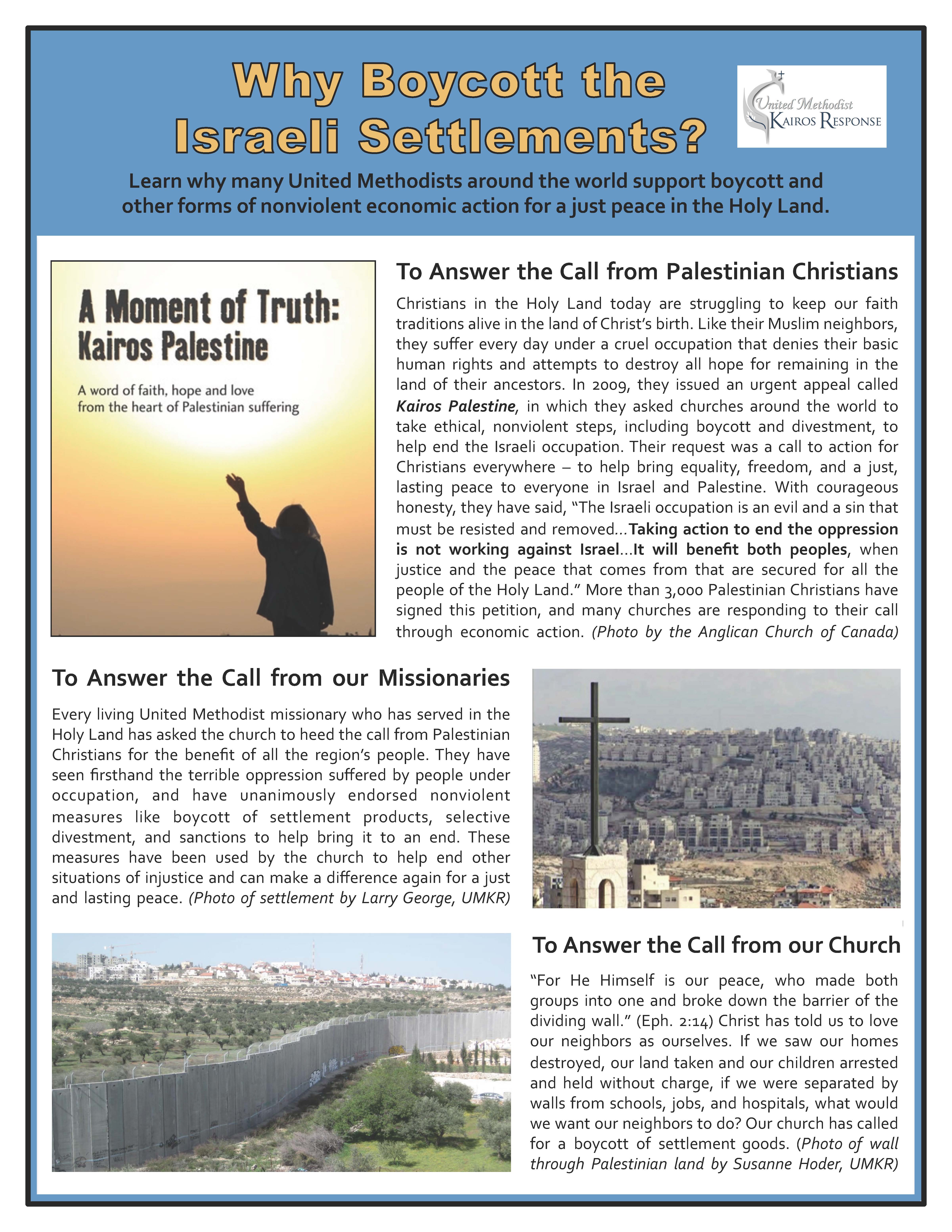 Why Boycott the Settlements
Why Boycott the Settlements
A four-page resource from 2015 that explains essential reasons for United Methodists to support the boycott of settlement products. From United Methodist Kairos Response. UMKR_WhyBoycottSettlements_2015
See more UMKR boycott resources at their website
More resources to be listed here.



